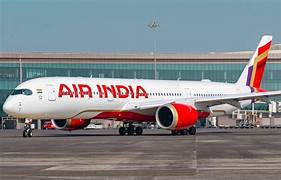
Air India Crash Compensation Form Revealed by India Today Amid Alleged Coercion Claims

 :
| Updated On: 04-Jul-2025 @ 1:57 pm
:
| Updated On: 04-Jul-2025 @ 1:57 pmSHARE
India Today has accessed a questionnaire sent by Air India to the families of victims of the tragic Ahmedabad plane crash, sparking a major controversy. The form, meant to process compensation claims, has become the center of debate after allegations surfaced that the airline was pressuring families to disclose financial information, including details about who was financially dependent on the deceased.
These allegations were raised by UK-based law firm Stewarts, which represents over 40 families affected by the crash. The firm accused Air India of “coercing” families into submitting sensitive financial details, with the implication that failure to do so could result in denied or reduced compensation. They argued that such questions could affect the final amount received by victims' families, especially when determining financial dependency.
Air India, however, has firmly rejected the allegations, calling them “unsubstantiated and inaccurate.” The airline has defended the need for such detailed information, stating that it is standard procedure required to process compensation and ensure that payments go to the rightful beneficiaries. According to Air India, the purpose of the questionnaire is to verify familial relationships and determine the proper distribution of interim and final payments.
The form clearly states that the final compensation amount will depend on the information shared by the families. Air India emphasized that this process is part of formal protocols that must be followed to facilitate advance payments and finalize the total compensation due for each victim.
The crash occurred on June 12, when a London-bound Boeing 787-8 operated by Air India tragically crashed into the premises of a medical college in Ahmedabad shortly after takeoff. Out of the 242 passengers and crew on board, all but one died. Additionally, 19 people on the ground were also killed, bringing the total death toll to 260.
In response to the tragedy, the Tata Group, which owns Air India, announced an initial compensation of ₹1 crore to the families of each deceased. Later, the group declared an additional ₹25 lakh in compensation for each family to address urgent financial needs.
Despite Air India’s clarification, the controversy continues to spark public debate and concern. The airline has reiterated that it is not rushing the families and is offering them time and flexibility to complete the required formalities. In an official statement, Air India said, “Understandably, there are some formal processes that must be followed, but we are giving families all the time and flexibility they need. We want to support however we can.”
The controversy has brought attention to the challenges and sensitivities surrounding compensation in the aftermath of aviation tragedies. While Air India insists that the information is vital for a fair and legally sound compensation process, critics argue that the grieving families should not be pressured or feel threatened with the possibility of losing their rightful claims.
As the investigation into the crash continues and compensation procedures unfold, the incident has reignited discussions on airline accountability, transparency, and the ethical treatment of victims' families during times of crisis.